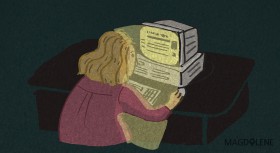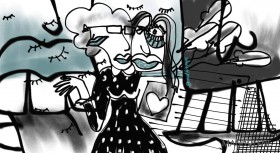I was watching The Normal Heart a couple of days ago when these following words really hit home, “Why are they letting us die?” That question underlined the frustration of gay people for being discriminated.
The television drama, directed by Ryan Murphy and based on Larry Kramer’s play by the same name, depicted the ups and downs (mostly downs) faced by the gay community in New York at the height of the HIV-AIDS crisis in early 1980s.
At the time, the disease of the human immune system had not even been identified as AIDS; it was better known as “gay cancer”. Actually, gay people in the United States were heavily discriminated even before the epidemic, but the spread of HIV/AIDS only heightened homophobia and the stigma towards homosexuality.
The ensemble cast, Mark Ruffalo, the oh-so-sexy Matt Bomer and Julia Roberts delivered strong performances.
Ruffalo’s character Ned Weeks is an outspoken and stubborn gay activist whose confrontational style of campaign frequently collides with that of his partner Felix Turner (Bomer) and his colleagues.
Roberts played Dr. Emma Brookner, a strong-willed physician who takes care of many AIDS patients – most of them gay men – even when most of the hospital staff at the time refused to do so. Murphy successfully portrayed the struggling of the film’s protagonists in the pursuit to make AIDS a priority issue amid the negative mainstream perception of it being a gay disease the time.
Currently, the US government clearly has made a great progress in improving public treatment of people with HIV/AIDS and in removing discriminations against them. In January 2010, for example, the US removed HIV status as a factor to be considered in the granting of travel visas.
What about in Indonesia? While we have made improvement in terms of medical treatment with, for example, a healthcare coverage program that includes people with HIV-AIDS, discrimination remains widespread, however.
This can be seen in the attitudes of and public statements made by political leaders. Last year, lawmaker Wirianingsih of the Prosperous Justice Party (PKS) said that AIDS patients should be reprimanded rather than given free medicines.
Last year, in October-December period alone, at least 8,624 new patients were diagnosed with HIV.
But it’s not all about discrimination against people living with HIV/AIDS, but also against those who struggle for being ‘different’.
Published on June 17, a joint UN report titled “Being LGBT in Asia: Indonesia Country Report”, highlighted the struggle faced by lesbian, gay, bisexual and transgender (LGBT) people in Indonesia, from a transgender who was rejected to work at a beauty salon because she “looks like a woman” to an openly gay male student who got humiliated by his lecturer for being “effeminate”.
As the Presidential Election coming next week, there is no doubt that many Indonesians are still subjected to harassment for being lesbians, gays, bisexuals and transgenders. Although their votes are count to put leaders in power, they still have zero representation in public office.
Two years ago, noted human rights activist Dede Oetomo, was booed by the lawmakers – who probably got their seats thanks to the votes from some LGBT people, too, by the way – during his selection as one of Indonesia’s National Commission on Human Rights (Komnas HAM) commissioners because of his status as an openly gay man. Dede is also a prominent gay activist in Indonesia.
Neither of the two presidential hopefuls, Joko Widodo and Prabowo Subianto, highlighted the importance of HIV/AIDS treatment in their campaigns; let alone how to purge this type of discrimination against LGBT people. What a shame that none of them highlighted the issue. Especially since it has been rumored that one of the candidates has a son who is “in the family”.
Actually, there was a tiny moment of hope for me as a gay man, when the ex-military general Prabowo acknowledged his son as a notable fashion designer during a televised debate against his opponent. I couldn't help but say "aw…." However, this country needs more than just a tender moment, which some people quickly dismissed as a mere political stunt.
I really, really want to be optimistic with my hopes that more Indonesian youngsters will give their support for the LGBT rights in the future, not just in social media, but also in their daily lives. But considering that many prominent individuals including politicians remaining in the closet (though I don’t blame them), we still have a long way to go.
Meanwhile, like the question asked in The Normal Heart, are we just going to be left dying? I have had enough of surviving, to be honest. This time, I want to thrive.
About Amahl S. Azwar
Amahl is an openly gay writer who lives in Bandung, West Java. His novelette, ‘Husbro’, will be featured in the upcoming ‘LGBTIQ’- Love-Gifted-Bravery-Trust-Imagination-Quest’, collected works of novella in collaboration with other writers including Hendri Yulius.








Comments